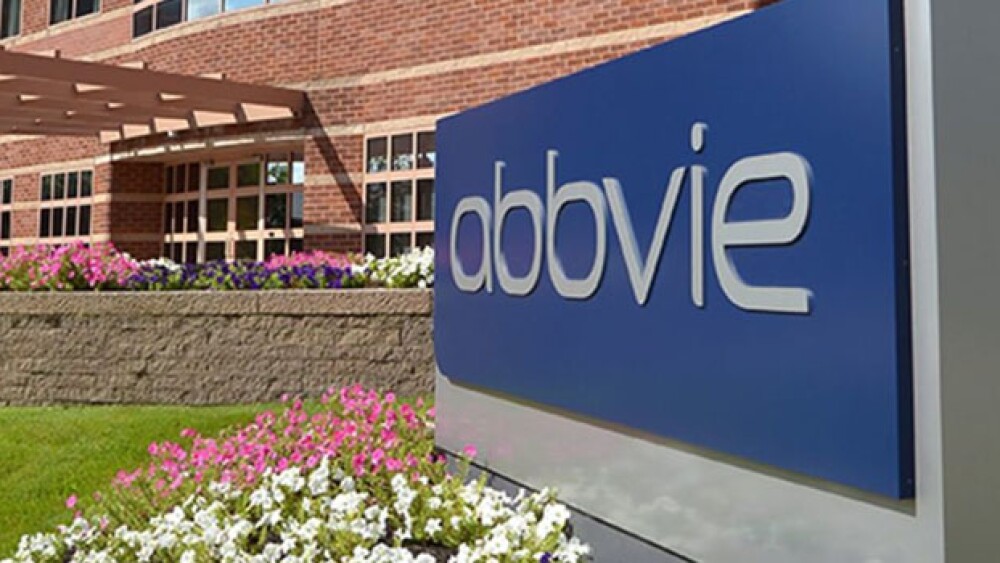A look at three drug approvals of vital importance to the company this year.
In late January, AbbVie provided unexpectedly strong 2018 guidance. Much of it was built on a projected corporate tax rate this year of about 9 percent, which caught almost everybody off guard. AbbVie said it was because of “a one-time net tax benefit related to the timing of the phase in of provisions of the new legislation on certain subsidiaries.”
Although AbbVie has infrastructure and possibly merger-and-acquisition plans for its unexpected surplus of money, much of its success will depend on approvals of several drugs—like sharks, biopharma companies need to keep moving to survive. Todd Campbell, with The Motley Fool, writes about three drug approvals of vital importance to the company this year.
1. Rova-T
Otherwise called rovalpituzumab tesirine, Rova-T is an antibody drug conjugate that targets the cancer stem cell-associated target delta-like protein 3 (DLL3). AbbVie picked it up when it acquired Stemcentrx for $5.8 billion upfront and another potential $4 billion in milestones in 2016.
Campbell writes, “Initially, Rova-T’s being evaluated in third-line or greater small-cell lung cancer, a setting plagued by poor outcomes and limited treatment choices. Small-cell lung cancer accounts for 15 percent of all lung cancers, and sadly, extensive-stage SCLC has just a five-year survival rate.”
AbbVie is expecting data in the second quarter from a third-line Rova-T study. If the results are positive, then it might get accelerated approval from the U.S. Food and Drug Administration (FDA), and if approved then, could hit the market late this year or early 2019.
It is also being evaluated as a first- and second-line SCLC drug, and is being tested in combination with Bristol-Myers Squibb’s Opdivo.
2. Upadacitinib
Upadacitinib (ABT-494) is a JAK1 selective inhibitor. It is being evaluated for rheumatoid arthritis (RA), Crohn’s disease, ulcerative colitis (UC), atopic dermatitis and psoriatic arthritis. In 2017, AbbVie released data from three Phase III clinical trials in rheumatoid arthritis. As a result, AbbVie expects to file with the FDA by the end of this year, at least if two additional RA trials support it. It also has ongoing Phase III trials in psoriatic arthritis and Crohn’s, and pivotal trials in eczema and UC are in the planning stages. Campbell writes, “It appears upadacitinib may have a good shot at disrupting those indications, given that positive Phase II data in eczema had the FDA granting it breakthrough therapy designation last month. If so, then AbbVie thinks upadacitinib’s peak sales could be $6.5 billion someday.”
3. Risankizumab
Risankizumab, or ABBV-066, is an anti-IL-23 antibody. It is also being studied for multiple inflammatory diseases, including psoriasis, Crohn’s and psoriatic arthritis. “Recently,” Campbell writes, “AbbVie reported data from its fourth successful study of risankizumab in psoriasis. That study showed that 73 percent of patients achieved PASI 90 and nearly half achieved PASI 100, or complete skin clearance, after taking risankizumab. For comparison, only 2 percent and 1 percent of patients achieved those levels in the placebo arm of the study, respectively.”
AbbVie plans to file for risankizumab by the end of the second quarter, which means a decision could happen in 2019. Because the drug could make headway in new patients and patients already taking anti-TNF drugs—including AbbVie’s Humira—it has the possibility of raking in $5 billion annually, according to the company.
Campbell writes, “There’s no telling what will happen with Rova-T, upadacitinib, and risankizumab’s ongoing trials or if the FDA will sign off on these drugs. Nevertheless, these three drugs represent AbbVie’s best shot at overcoming any future decline in Humira demand and continuing its streak of sales and profit growth.”





